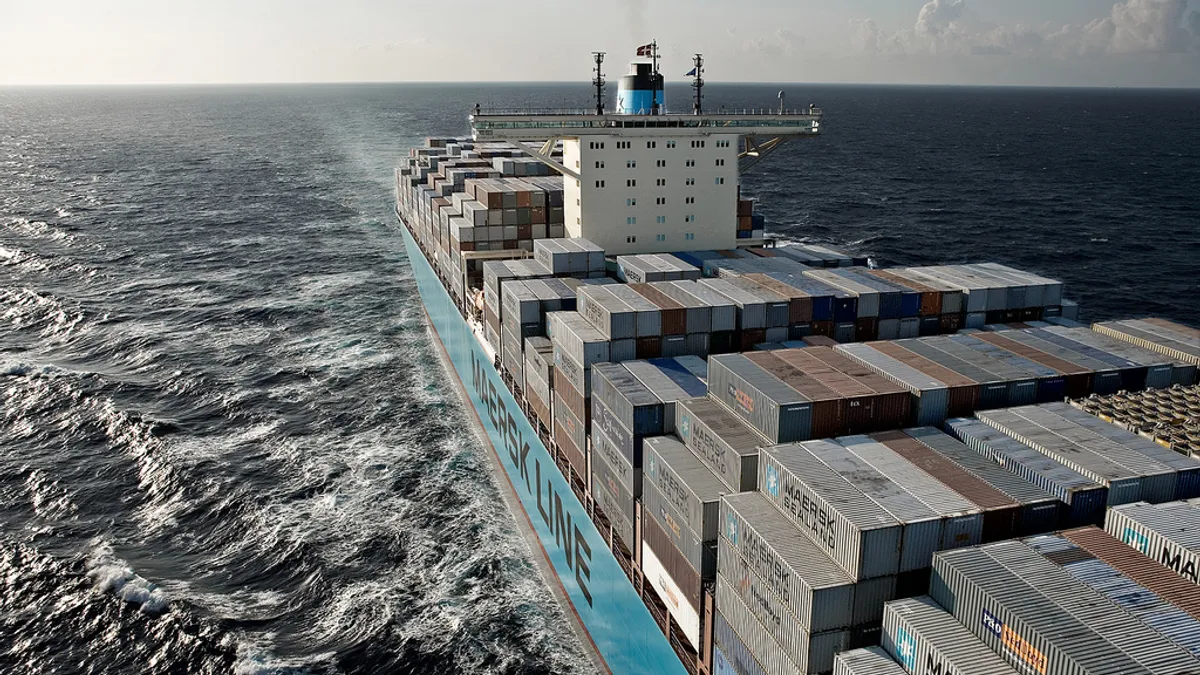Dive Brief:
- The U.S. Justice Department subpoenaed executives from Maersk Line, Hapag-Lloyd, Evergreen Marine and Orient Overseas Container Line (OOCL) over price fixing allegations, Reuters and The Wall Street Journal report.
- The subpoenas were issued at a meeting of the world's 20 largest lines in San Francisco, colloquially known as the Box Club, and reports indicate many of the executives in attendance were summoned. No specific allegations were included in the subpoenas, however.
- The Journal points out rising transport prices from Asia to Europe and idling ships may provide clues to artificially inflated rates. Meanwhile, Reuters suggests the price fixing probe will put the new alliances in the spotlight.
Dive Insight:
Though a Federal Maritime Commissioner dismissed claims of price fixing as recently as November, 2016, shippers remain concerned rates are being artificially increased as industry consolidation continues.
Maritime carriers have been suffering over the past few years from overcapacity coupled with a large-vessel arms race, and consequently high debt. These factors combined with slowing global traded to drive transport rates down significantly. Meanwhile, the industry's problems boiled over when Hanjin Shipping, the world's sixth-largest carrier at the time, sunk from debt.
Now, the industry is trying to surface in every way possible: new alliances were formed, new vessel orders were postponed, consolidation accelerated and more, younger ships were sent to the scrapyard. Each major actor appears poised to do their share to reduce capacity. So, amid a new round of contracting carriers have every incentive to raise rates, if possible.
The problem is that at present, capacity has yet to shift significantly. New alliances do not go into effect until April, mergers have not all closed and Hanjin's bankruptcy left many ships idle, many of which took time to resell to another line.
The Wall Street Journal points out that shippers in the Asia - Europe trade lanes have seen rates rise to $960 per container in 2017 from $695 in 2016, and suspect carriers are purposefully idling their fleets to decrease capacity utilization. Based on their calculations, however, carriers argue rates below $1,400 per TEU cannot be sustained.
In other words, the shipping industry is at a crossroads this season but shippers are contracting based on historic data while carriers are attempting to push up rates based on future expectations. This is an age-old problem, of course, and in fact price fixing allegations are common within the industry.
In 2013, the European Union instigated an antitrust probe when transport prices seemed unusually aligned after public statements were issued by representatives of various lines. The investigation occurred as a result of alleged “concerted practices” which allow for simultaneous price adjustments without formal agreement. At that time, it was believed that the possibility of communicating price intentions may have been happening. No charges were brought as a result of the investigation.
The results of a similar probe in China last year turned out quite differently, however, when eight shipping lines were fined $63 million after being found guilty of price collusion when transporting vehicles and heavy machinery. Japan's NYK Line, Mitsui OSK Lines and K Line were among those involved.
The U.S. antitrust investigation may just be another probe into long-standing allegations by shippers, but it comes at a pivotal time for the industry. The results of the investigation may not be known until the end of this year, however, based on a timeline of similar Justice Department investigations.













